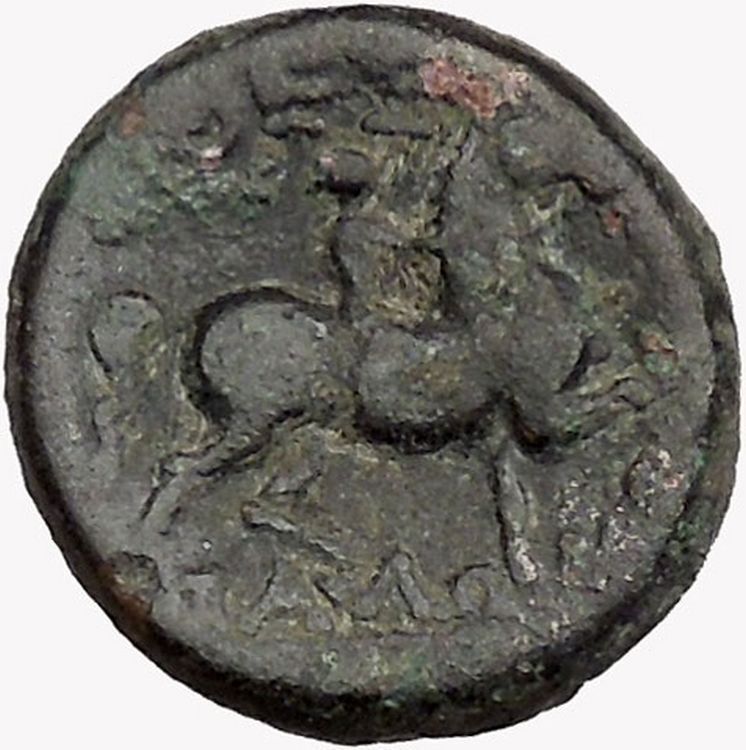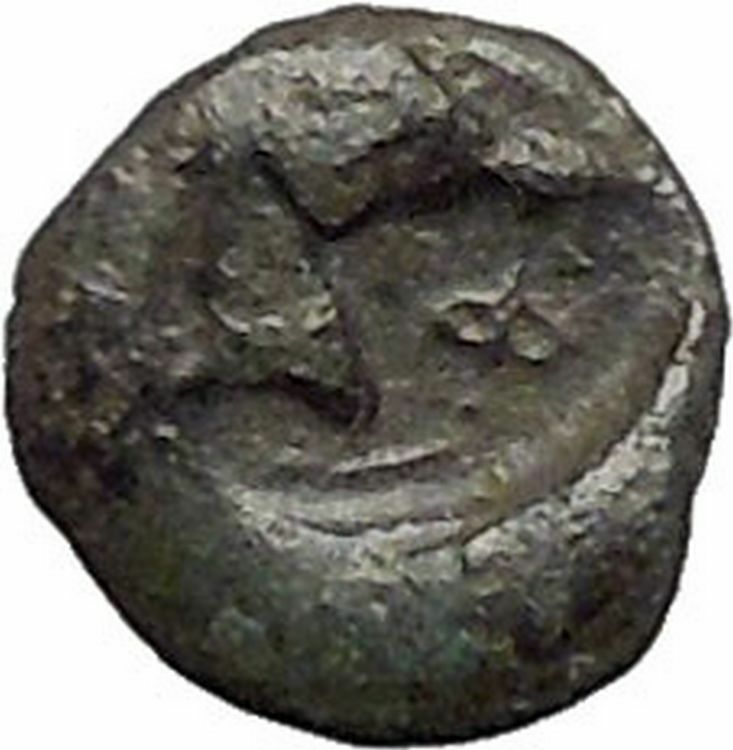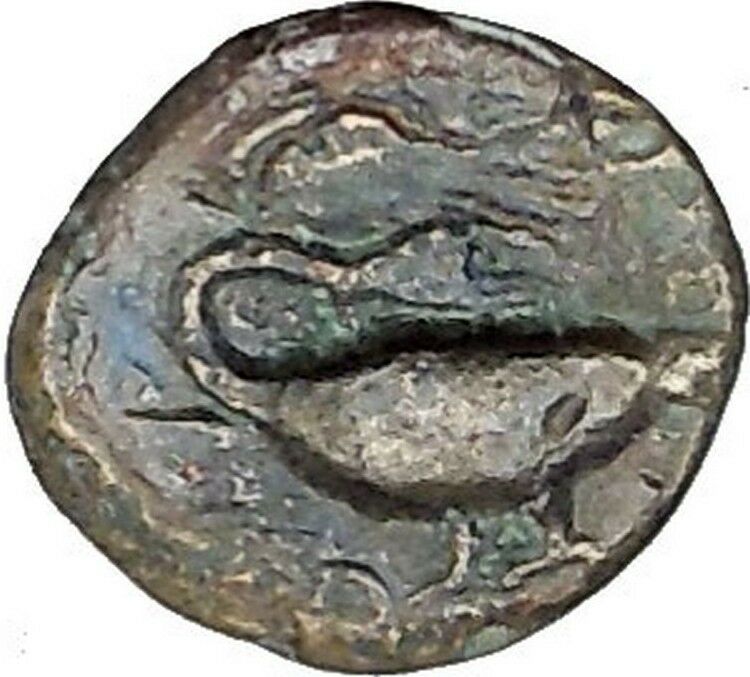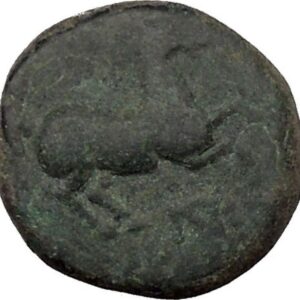|
Greek Coin of Seleukid Kingdom
Antiochos VII Sidetes – King: 138-129 B.C.
Bronze 18mm (6.00 grams) Antioch on the Orontes mint, struck circa 138-129 B.C.
Reference: Sear 7098 var. (date); HGC 9, 1087
Winged bust of Eros (Cupid) right wreathed with myrtle.
Head-dress of Isis; on right, ΒΑΣΙΛΕΩΣ / ANTIOXOY; on left, EYEPΓETOY; monogram in left field, beneath, crescent and Seleucid era date.
Almost alone amongst the later Seleukid monarchs, Antiochos VII ruled with competence and integrity. He was the younger brother of Demetrios II, and following the latter’s capture by the Parthians he seized power and quickly disposed the usurper Tryphon. He campaigned with success in Palestine and Babylonia, but in 129 B.C. he was killed in battle against the Parthians.
You are bidding on the exact item pictured, provided with a Certificate of Authenticity and Lifetime Guarantee of Authenticity.

Eros, in Greek mythology, was the primordial god of sexual love and beauty. He was also worshipped as a fertility deity. His Roman counterpart was Cupid (“desire”), also known as Amor (“love”). In some myths, he was the son of the deities Aphrodite and Ares, but according to Plato’s Symposium, he was conceived by Poros (Plenty) and Penia (Poverty) at Aphrodite’s birthday. Like Dionysus, he was sometimes referred to as Eleutherios, “the liberator”.
Conception
Throughout Greek thought, there appear to be two sides to the conception of Eros. In the first, he is a primeval deity who embodies not only the force of love but also the creative urge of ever-flowing nature, the firstborn Light for the coming into being and ordering of all things in the cosmos. In Hesiod’s Theogony, the most famous Greek creation myth, Eros sprang forth from the primordial Chaos together with Gaia, the Earth, and Tartarus, the underworld; according to Aristophanes’ play The Birds (c. 414 BC), he burgeons forth from an egg laid by Nyx (Night) conceived with Erebus (Darkness). In the Eleusinian Mysteries, he was worshiped as Protogonus, the first-born.
Worship of Eros was uncommon in early Greece, but eventually became widespread. He was fervently worshiped by a fertility cult in Thespiae, and played an important role in the Eleusinian Mysteries. In Athens, he shared a very popular cult with Aphrodite, and the fourth day of every month was sacred to him.
Eros and Psyche
The story of Eros and Psyche has a longstanding tradition as a folktale of the ancient Greco-Roman world long before it was committed to literature in Apuleius’ Latin novel, The Golden Ass, this is apparent and an interesting intermingling of character roles. The novel itself is picaresque Roman style, yet Psyche and Aphrodite retain their Greek parts. It is only Eros whose role hails from his part in the Roman pantheon.The story is told as a digression and structural parallel to the main storyline of Apuleius’ novel. It tells of the struggle for love and trust between Eros and Psyche. Aphrodite is jealous of the beauty of mortal Psyche, as men are leaving her altars barren to worship a mere human woman instead, and so commands her son Eros to cause Psyche to fall in love with the ugliest creature on earth. Eros falls in love with Psyche himself and spirits her away to his home. Their fragile peace is ruined by a visit from Psyche’s jealous sisters, who cause Psyche to betray the trust of her husband. Wounded, Eros leaves his wife and Psyche wanders the Earth, looking for her lost love.
In Apuleius’s The Golden Ass, Psyche bears Cupid a daughter, Voluptas (“Pleasure, Desire”).
 Isis or in original more likely Aset was a goddess in Ancient Egyptian religious beliefs, whose worship spread throughout the Greco-Roman world. She was worshiped as the ideal mother and wife as well as the matron of nature and magic. She was the friend of slaves, sinners, artisans, the downtrodden, as well as listening to the prayers of the wealthy, maidens, aristocrats and rulers. Isis is the Goddess of motherhood, magic and fertility. Isis or in original more likely Aset was a goddess in Ancient Egyptian religious beliefs, whose worship spread throughout the Greco-Roman world. She was worshiped as the ideal mother and wife as well as the matron of nature and magic. She was the friend of slaves, sinners, artisans, the downtrodden, as well as listening to the prayers of the wealthy, maidens, aristocrats and rulers. Isis is the Goddess of motherhood, magic and fertility.
The goddess Isis (the mother of Horus) was the first daughter of Geb, god of the Earth, and Nut, the goddess of the Overarching Sky, and was born on the fourth intercalary day. At some time Isis and Hathor had the same headdress. In later myths about Isis, she had a brother, Osiris, who became her husband, and she then was said to have conceived Horus. Isis was instrumental in the resurrection of Osiris when he was murdered by Set. Her magical skills restored his body to life after she gathered the body parts that had been strewn about the earth by Set. This myth became very important in later Egyptian religious beliefs.
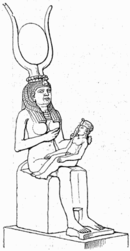
Isis nursing Horus, wearing the headdress of Hathor
Isis is also known as the goddess of simplicity, protector of the dead and goddess of children from whom all beginnings arose. In later myths, the Ancient Egyptians believed that the Nile River flooded every year because of her tears of sorrow for her dead husband, Osiris. This occurrence of his death and rebirth was relived each year through rituals. The worship of Isis eventually spread throughout the Greco-Roman world, continuing until the suppression of paganism in the Christian era.
Antiochus VII Euergetes, nicknamed Sidetes (from Side), ruler of the Hellenistic Seleucid Empire, reigned from 138 to 129 BC. He was the last Seleucid king of any stature.
Biography
He was one of the sons of Demetrius I Soter, the brother of Demetrius II Nicator and his mother may have been Laodice V. Antiochus was elevated after Demetrius’ capture by the Parthians. He married Cleopatra Thea, who had been the wife of Demetrius. Their offspring was Antiochus IX, who thus became both half-brother and cousin to Seleucus V and Antiochus VIII.
Sidetes defeated the usurper Tryphon at Dora and laid siege to Jerusalem in 132. During the siege he allowed a seven day truce for the Jews to celebrate a religious festival, impressing the Jewish leadership. According to Josephus the Hasmonean leader John Hyrcanus opened King David’s sepulchre and removed three thousand talents, which he then paid Antiochus to spare the city. Nevertheless, King Antiochus’ respectful treatment of the Jews, and respect for their religion, earned him their gratitude and added name, Euergetes (“the Benefactor”). With no Jewish sources of that time (the Book of Maccabees ends few years before his time) it is unclear if the siege on Jerusalem ended with a decisive Seleucid victory or simply a peace treaty. Furthermore, the fact is that Jewish forces later assisted Sidetes in his wars, and that for nearly 20 years after his death, John Hyrcanus refrained of attacking areas under Seleucid control. All in all it indicates a renewal of the friendly relations from the time of Demetrius II.
Antiochus spent the final years of his life attempting to reclaim the lost eastern territories, overrun by the Parthians under their “Great King”, Mithridates I. Marching east, with what would prove to be the last great Seleucid royal army (including a unit of Judean troops under John Hyrcanus), he defeated Mithridates in two battles, killing the aged Parthian king in the last of these. He restored Mesopotamia, Babylonia and Media to the Seleucid empire, before dispersing his army into winter quarters.
The Seleucid king and army spent the winter feasting, hunting, and drinking (the Seleucids maintained the Macedonian tradition of heavy drinking). As with any time an army is quartered upon a population, tensions soon grew between the locals and the Seleukian troops.
The new Parthian ruler, Phraates II, had not been idle; raising a new army while stirring up rebellion in the Seleucid occupied towns of Media. Hoping to further sew dissension amongst his foe, Phraates also released his long-held prisoner, Demetrius II, Antiochus’ older brother, to return to Seleukia and reclaim the throne.
That winter (130-129 BCE), several Median towns rose in rebellion and attacked their Seleucid garrisons. Antiochus marched to support one such isolated garrison with only a small force (likely only his Royal Guards). In a barren valley, he was ambushed and killed by Phraates II and a large force of Parthians, which had entered the country without being detected. The last great Seleucid king died in battle, a fitting end for the heir of Seleucus I Nicator (the Victor). (One disputed account has Antiochus take his own life, after the battle is lost, to avoid capture by the Parthians.)
After Antiochus VII Sidetes, the Parthians regained the territory briefly lost, and the Seleucid realm was now restricted to Seleukia.
|






 Isis or in original more likely Aset was a goddess in Ancient Egyptian religious beliefs, whose worship spread throughout the Greco-Roman world. She was worshiped as the ideal mother and wife as well as the matron of nature and magic. She was the friend of slaves, sinners, artisans, the downtrodden, as well as listening to the prayers of the wealthy, maidens, aristocrats and rulers. Isis is the Goddess of motherhood, magic and fertility.
Isis or in original more likely Aset was a goddess in Ancient Egyptian religious beliefs, whose worship spread throughout the Greco-Roman world. She was worshiped as the ideal mother and wife as well as the matron of nature and magic. She was the friend of slaves, sinners, artisans, the downtrodden, as well as listening to the prayers of the wealthy, maidens, aristocrats and rulers. Isis is the Goddess of motherhood, magic and fertility.


